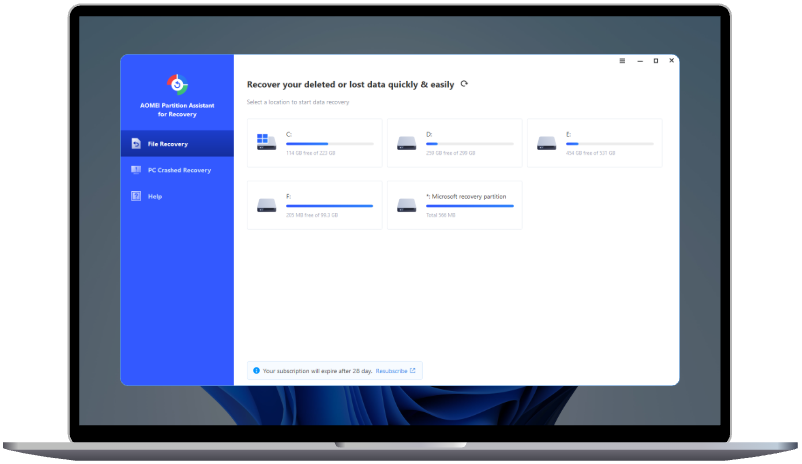How to Recover Unsaved Word Document From OneDrive or Local PCs?
In this passage, you will know how to recover unsaved Word document from OneDrive or local Windows PC. It gives a comprehensive guide about unsaved Word document recovery.
Using Word documents makes it easy to create, edit, and organize your files. However, unexpected problems like software crashes, power outages, or accidentally closing a document without saving can result in lost work. This can be stressful, especially if the document is important. While it’s a good idea to back up your work often, many people forget to do it regularly.
The good news is that you can recover unsaved Word documents no matter what version of Word you are using, such as 2007, 2013, 2016, or newer. This guide will show you simple ways to get your unsaved documents back. Even if you delete a file by mistake or your system crashes, there are ways to recover your work and prevent losing it for good.
How to recover unsaved Word document from OneDrive or Local?
For unsaved Word document recovery, you will have 3 choices. This part will share specific methods with steps for you.
Way 1. Recover unsaved word document from OneDrive
Word allows users to back up their documents to OneDrive, making it possible to recover unsaved files. If you are saving your work to OneDrive, changes made to a document are automatically synced, offering an easy way to restore your files.
Step 1. Visit OneDrive and log in with your Microsoft account.
Step 2. Locate the folder where the unsaved Word file is stored. Select the file and click the Download button to save it to your computer.
Tip: If you accidentally deleted the file using the Shift + Delete keys, check the Recycle Bin in OneDrive. Simply select the file and click Restore at the top to recover it.
Way 2. An all-in-one method to recover Word unsaved document
If your files are missing from OneDrive, don’t worry—there are ways to recover them. On Windows, OneDrive files are usually stored in the folder C:\Users[your username], where your synced files and folders are kept. To recover lost Word files quickly and easily, you can use a reliable recovery tool. For example, AOMEI Partition Assistant for Recovery can help you restore unsaved Word documents from both OneDrive and your local Windows system, even if the files are permanently deleted from Windows Recycle Bin or OneDrive.
AOMEI Partition Assistant for Recovery offers these powerful features:
🙆🏼♀️ All-encompassing: It helps recover data lost due to accidental deletion, system crashes, virus attacks, formatting, or emptying the Recycle Bin.
⚡ Convenient: It is user-friendly, enabling all users to operate it without any issues.
🧐 Competent: It can recover over 1,000 types of data, including photos, videos, and documents, from a wide range of storage devices like HDDs, SSDs, SD cards, and USB flash drives.
💪🏼 Compatible: It is compatible with NTFS, FAT32, exFAT, ReFS, and Windows Server on Windows 11/10/8/7.
Step 1. Install and launch AOMEI Partition Assistant for Recovery first, and then choose the exact partition or drive where the deleted files were originally located.
Step 2. Scan the selected drive. It will execute a Quick Scan first to find your data fast, followed by a Deep Scan to search for additional lost data comprehensively.
Step 3. Once the scan is complete, all recoverable files will be displayed. Kindly choose the specific files and then click Recover.
Step 4. Choose a destination folder to save the recovered files, and wait for the recovery process to finish.
Way 3. Recover unsaved Word document Locally with AutoRecover
Losing unsaved Word documents can be frustrating, but don’t worry—you might still recover them using AutoSave files (*.asd). To find unsaved Word files, AutoSave must be enabled beforehand. If this feature is active, you can locate unsaved files and recover them easily through the recovery process.
Step 1. Find the file saving path (e.g.: C:\Users\Username\AppData\Local\Microsoft\Office\UnsavedFiles).
Step 2. Here, copy the file name of the Word document you want to recover.
Step 3. Open your Microsoft Word, click "File". Then, click "Manage Document" and select "Recover Unsaved Documents" from the drop-down list. Please paste the copied file into the file name column and click "Open".
Manual active the AutoRecover: Click “File” > “Options” > “Save”. Then tick “Save AutoRecover information every x minutes” > “Keep the last autosaved version if I close without saving” > “OK”.
● To enable AutoRecover, go to File > Options > Save and ensure that the "Save AutoRecover information every X minutes" and "Keep the last AutoRecovered version if I close without saving" options are checked.
● For Office 365 users, AutoSave can be enabled by clicking the AutoSave toggle in the top-left corner of the Word window if you are working on a document stored in OneDrive or SharePoint.
Conclusion
The 3 methods about how to recover unsaved Word document from OneDrive or Local Windows PCs are practical and easy-to-use. In conclusion, losing a Word document doesn’t mean it’s gone forever. Whether it’s caused by a crash, accidental deletion, or not saving, there are simple ways to recover your work. You can use OneDrive to restore backed-up files, tools like AOMEI Partition Assistant for Recovery for lost files, or Word’s AutoRecover feature to find unsaved documents. To avoid losing work in the future, turn on AutoSave and back up your files regularly. These steps can help keep your important documents safe and easy to recov

